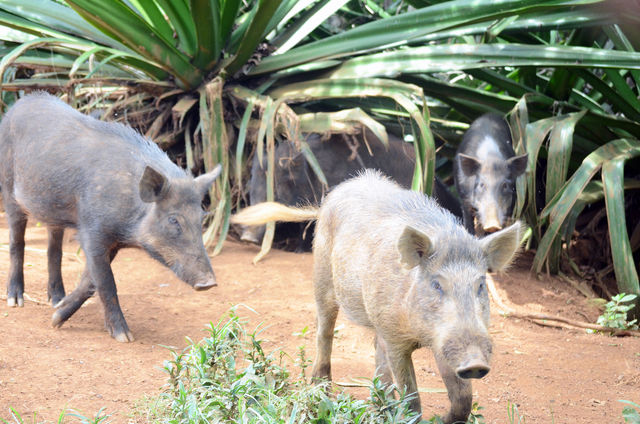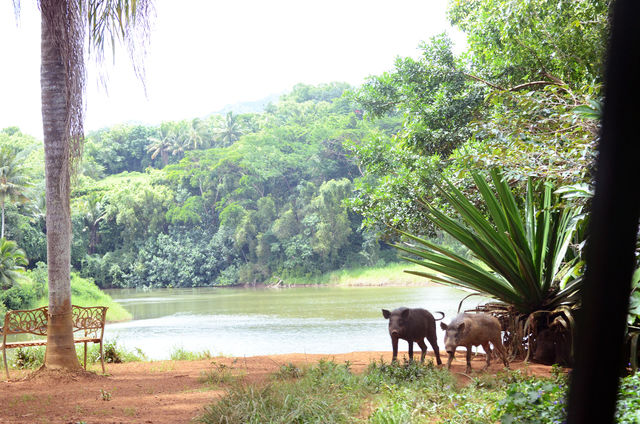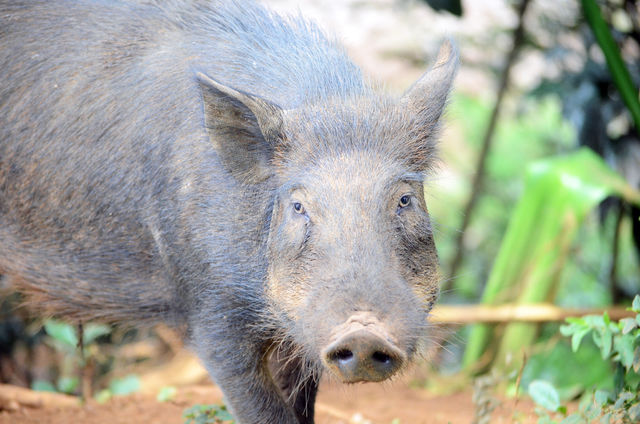KILAUEA — The estimated 100 pigs rooting around a pasture on Kauai’s North Shore have neighbors concerned about their crops, but the owners of the land say they are operating a wildlife sanctuary and the swine aren’t stirring up any
KILAUEA — The estimated 100 pigs rooting around a pasture on Kauai’s North Shore have neighbors concerned about their crops, but the owners of the land say they are operating a wildlife sanctuary and the swine aren’t stirring up any trouble.
Drive by the pasture, especially in the evening, and you may see them browsing through mowed grass. You’re also likely to see a handful of cars pulled over on the side of the road and people milling about the fence line, taking pictures.
“These are wild pigs that have chosen this as a safe place,” said Bev Harter, who owns the 35-acre He Makana Ka Wai Wildlife Sanctuary with her husband, Jack.
Though the Harters are pleased the pigs have chosen their pasture for sanctuary, some the neighbors aren’t on board. In fact, they’ve delivered a petition, with more than 150 signatures, to the Department of Land and Natural Resources asking for state intervention.
“It’s just not great for the pigs, or for the community here,” said Lee Roversi, owner of an organic farm in the area and the creator of the petition. “There’s a lot of levels to this issue, but it’s a traffic nightmare, and the pigs leave the field at night and cause all kinds of damage in the neighboring farms and gardens.”
It started with two
Harter said it all started about six years ago, when two babies wandered down when some development and land clearing was happening above their property.
“We called them Lisa and Henry, and we found them hiding in the bushes,” Harter said.
She said an employee helped spay and neuter the pigs when they grew up, and the Harters had them for about three years before someone killed them. After that, more pigs just kept coming.
Harter said since people are pulling over and expecting to see the animals, she’s started calling the pigs out into the pasture in the evenings.
“There’s some tourists that stop by and want to see them, and then there’s also locals with their families,” Harter said. “The kids just love them.”
But the neighbors are saying they’ve lost hundreds of dollars worth of cassava, sweet potato and taro, their gardens are destroyed, and they’re investing hundreds of dollars in fencing to try to keep the pigs out. They’re also concerned about safety.
“I have personally seen seven or eight cars at time there (on the side of the road) and children as young as 5 and 8 years old feeding the pigs,” Roversi said. “These are wild animals and it’s a busy highway and it worries me.”
The neighbors are also concerned that since the Harters aren’t feeding the pigs anymore, the group will spread out and claim larger territory, causing more damage.
One neighbor, Steve Hunt, has proposed butchering all the pigs and feeding them to the island’s hungry people.
“A wonderful thing to do would be to take all these pigs and give their meat to the food banks for the people who need food,” Hunt said. “That needs health department approval, and it’s probably pretty complicated, but it could be a possibility.”
He Makana Ka Wai Wildlife Sanctuary
For the past three decades, the Harters have been taking animals under their wing. Currently the property is home to 100 cats — all of which have been spayed or neutered — a swan, four or five horses, and nesting cattle egrets, as well as the feral pigs.
“We just take in the animals that people drop off or abandon, or just can’t care for anymore,” Harter said. “We stopped taking in old horses and dogs a few years ago because we did not want them to outlive us and be left stranded with no one to care for them.”
Nightly, as the pair feed the cats, they’ve traditionally tossed some corn out for the nene and other birds that frequent their field. They wonder if that may have drawn a few more pigs from the mountain, but say they’ve stopped that practice.
“I’d guess we have maybe 70 or 80 pigs here, and we don’t feed them, they just forage in the field for themselves,” Harter said. “We’ve also had Tom from DLNR come out and he gave us a few ideas.”
Thomas Kaiakapu, Kauai district biologist with the Department of Fish and Wildlife, suggested they add another line of fencing to the triple-strand barbed wire they’ve added to the bottom of their wooden fence.
“The pigs aren’t jumping over the three wires now, but he thought it might help discourage them if they think about doing it,” Harter said.
Roversi said Kaiakapu has met with a group of concerned neighbors as well. Representatives from DLNR confirmed they’re in discussions with the parties involved, but declined to comment further.
According to Sarah Blane, county spokeswoman, Kauai Police Department officers have stopped by to check out the traffic drawn by the pigs.
“The officer did see the large number of pigs, roughly 100 is a fair estimate,” Blane said. “However, there were no traffic or other violations observed and the pigs were not seen crossing the highway.”
KPD has not responded to any traffic crashes caused by the pigs in that area, Blane said. She also said there are currently no laws that prohibit people from feeding feral pigs.
County Councilman Mason Chock said he doesn’t see the County Council passing an ordinance to address feeding feral pigs, because DLNR is working on the case.
However, he said, the council is bringing the issue of feral pig overpopulation to the surface in the hopes of generating community conversation.
It’s island-wide issue
“The feral pig population on island is an issue in general,” Chock said. “But it falls within the scope of the state and DLNR.”
Rep. Derek Kawakami said at Tuesday’s Lihue Business Association legislative review that the Legislature is actually working with DLNR and the hunting community to come up with a gaming commission that would create a game management plan for Hawaii — something that isn’t currently in existence.
“Feral pigs are a problem, especially in our watershed areas, and that’s why DLNR has initiated a watershed protection program that incorporates our hunting community as well,” Kawakami said. “Some areas in the North Shore are really affected, and unfortunately it has created a nuisance in the Kilauea area. We are taking a look at this problem.”
While the conversation swirls on an island swamped with swine, the Harters are hoping their hogs won’t draw any more attention, and that they’ll be allowed to live in peace on their property.
“I don’t know why people like the pigs so much, but they do,” Jack Harter said. “I guess, to a lot of people, they’re an anomaly.”




